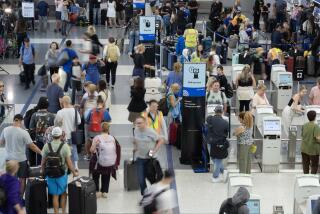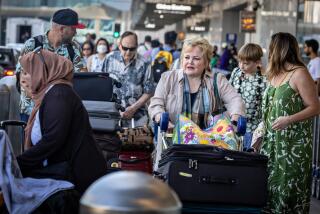5 Airlines Ignore Crew Security Checks at LAX
- Share via
Five major airlines have ignored a plea from Los Angeles International Airport authorities--made after last December’s PSA jet crash caused by a gun-wielding former airline employee--that all flight crews pass through airport metal detectors, The Times has learned.
Officials from American Airlines, United Airlines and TWA confirmed that some of their crews bypass normal passenger metal detectors. They said their current security procedures are effective and argued that switching to metal detectors would be costly and inefficient. Furthermore, they said, their security policies have been approved by the Federal Aviation Administration.
Public Relations Gesture
A United official, who asked not to be named, said United crew members who do pass through normal passenger metal detectors do so primarily as a public relations gesture. Seeing crew members submit to the same sort of inspections gives waiting passengers a “warm and cozy” feeling, the official said.
LAX officials added that Delta Air Lines and Continental Airlines, like the three other airlines, are also ignoring “the spirit” of an Airport Commission request made last Dec. 16 to the FAA to require all airline employees to pass through the detection devices. Delta and Continental officials refused to discuss their security procedures or whether they sometimes allow crew members to bypass metal detectors.
Only Pan American World Airways, among the six airlines that lease property at Los Angeles International, sends all of its employees through the special metal-detection screening required of ticketed passengers.
Alan Loflin, a Pan Am spokesman in New York, said that after the PSA crash, the airline is requiring “our people to go through security as if they are passengers.” LAX officials confirmed Pan Am’s cooperation.
While the FAA has not acted on the Airport Commission’s request, crew members from all other domestic airlines have been directed to undergo the same sort of screening as passengers do, LAX officials said.
Baggage Crew Also
Airport officials said that all international carriers operating out of the Tom Bradley International Terminal also submit their crews to metal-detection checks.
Airport Manager Stephen Yee, at the request of City Councilman Richard Alatorre, said he will meet with representatives of all five airlines next week to try to persuade them to adopt a universal metal-detection system. Yee noted that while the five airlines are not using the metal detectors, they nevertheless fully comply with FAA security regulations.
Airport security has become an important public issue since last Dec. 7, when a disgruntled former USAir employee smuggled a gun aboard a PSA jet and apparently fired several shots that eventually caused the aircraft to crash, killing all 43 passengers and crew aboard. It was reported later that the fired employee, David A. Burke, had simply flashed his identification card, which he had not surrendered, and did not submit to an electronic screening.
After the PSA crash, the FAA directed all airport employees using public terminals to pass through the same preboarding metal-detection and X-ray devices that inspect passengers and luggage.
At about the same time, Alatorre conducted hearings into airport security and said he received assurances that everyone, including airline employees, would submit to a metal-detector inspection.
Several weeks ago, Alatorre learned that a number of the major domestic airlines at LAX had ignored the commission’s request and continued to permit crews reporting for work at the airport to proceed directly to airline operations centers in secure areas without going through metal detectors. The crew members, including the pilot, co-pilot and flight attendants, are then transported directly to the aircraft.
Alatorre said he had been under the clear impression there would be an across-the-board security system at LAX involving the metal detectors.
“When (airport officials) testified . . . everybody was going to have to go through, at a minimum, a metal detector and not be able to get around it,” Alatorre said.
Airport Deputy Director Donald Miller said local officials have no power to force domestic airlines to require all of their employees to submit to a metal-detection screening. Security is determined by the individual airlines, which must receive approval of their screening programs from the FAA.
Miller and Yee said that most of the domestic carriers have complied with the request and send their crews through the regular passenger screening. Miller said he is not certain why the five major airlines are not cooperating with the spirit of the airport’s request.
“I think the primary reason they’re not doing it is there’s no federal requirement to do it,” Miller said.
An FAA spokeswoman confirmed that while the domestic airlines are required to screen all flight crews before boarding, there is no clear definition of what that screening entails. The spokeswoman, Barbara Abels, said metal-detection screening is only required of flight crews using passenger access to their planes.
She said that any tightening of that requirement would need U.S. Department of Transportation approval. Hal Paris, a Department of Transportation spokesman, said a revision of metal-detection screening procedures is not in the works.
But Kenneth Meade, associate director of the General Accounting Office in Washington, said some changes may be recommended in an upcoming review of national airport security policies.
“We’re examining the implementation of (FAA) rules that employees go through the screening process and how well that is going,” Meade said. “The focus ought to be making sure that all access to air operations areas are secure.”
Richard Livingston, an official with the 40,000-member International Airline Passengers Assn., said he had been surprised to learn that some airlines were not screening all of their crew members. He added, however, that the organization is not convinced that metal detection is the best answer to prevent incidents like that which resulted in the PSA crash.
“Our conviction is we don’t really care what the airlines use as long as the screening process is complete and accurate,” Livingston said.
Jim Brown, a spokesman for American, defended the airline occasionally allowing flight crews to bypass metal detectors. He also said American had no plans to install a metal-detection system at its flight operations centers, saying such a system would involve a “truly enormous cost and a situation where it just wouldn’t be feasible.”
“(American crews) don’t go through the same system as do other employees, but it is a special security screening procedure that has been implemented which we have full faith and confidence in. (The system) is as comprehensive in nature as the regular screening system in front of the terminal,” Brown said, not elaborating.
More to Read
Sign up for Essential California
The most important California stories and recommendations in your inbox every morning.
You may occasionally receive promotional content from the Los Angeles Times.













